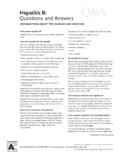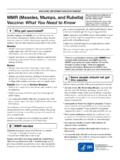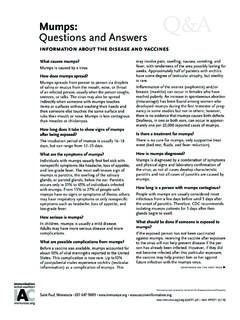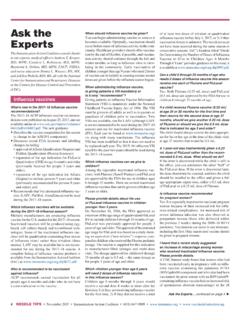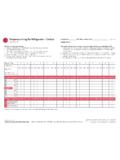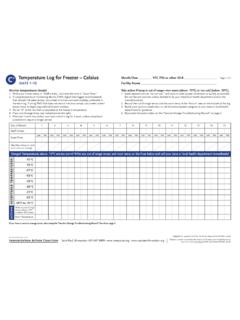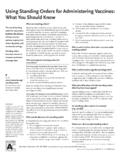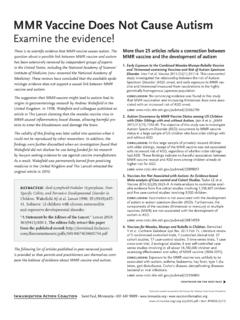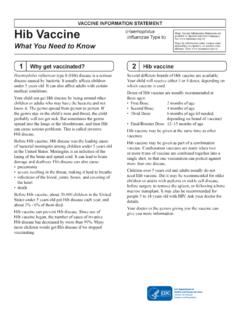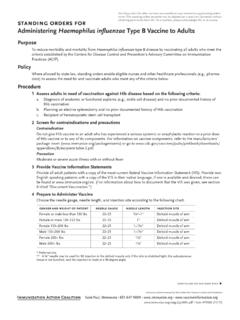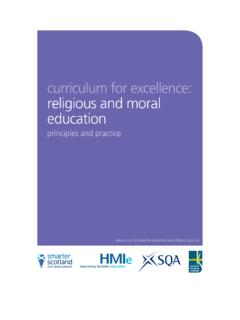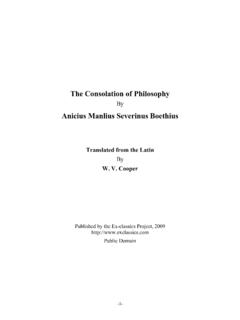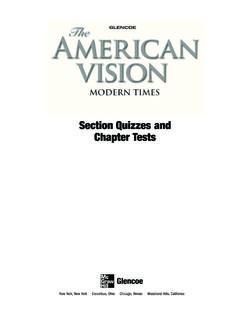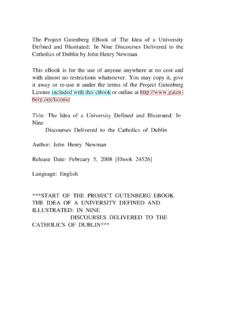Transcription of What the World's religions teach, applied to vaccines and ...
1 Vaccine 31 (2013) 2011 2023 Contents lists available at SciVerse ScienceDirectVaccinejou rn al h om epa ge: the world s religions teach , applied to vaccines and immune globulinsJohn D. Grabenstein ,1 Merck vaccines , 770 Sumneytown Pike, WP97-B364, West Point, PA 19426, USAa r t i c l e i n f oArticle history:Received 20 October 2012 Received in revised form21 December 2012 Accepted 7 February 2013 Available online 26 February 2013 Keywords:ReligionBeliefsVaccinesAntibodi esImmune globulinsa b s t r a c tFor millennia, humans have sought and found purpose, solace, values, understanding, and fellowshipin religious practices. Buddhist nuns performed variolation against smallpox over 1000 years ago. SinceJenner developed vaccination against smallpox in 1796, some people have objected to and declinedvaccination, citing various religious reasons. This paper reviews the scriptural, canonical basis for suchinterpretations, as well as passages that support immunization. Populous faith traditions are considered,including Hinduism, Buddhism, Jainism, Judaism, christianity , and Islam.
2 Subjects of concern such asblood components, pharmaceutical excipients of porcine or bovine origin, rubella strain RA 27/3, andcell-culture media with remote fetal origins are evaluated against the religious concerns review identified more than 60 reports or evaluations of vaccine-preventable infectious-diseaseoutbreaks that occurred within religious communities or that spread from them to broader multiple cases, ostensibly religious reasons to decline immunization actually reflected concerns aboutvaccine safety or personal beliefs among a social network of people organized around a faith community,rather than theologically based objections per se. Themes favoring vaccine acceptance included transfor-mation of vaccine excipients from their starting material, extensive dilution of components of concern,the medicinal purpose of immunization (in contrast to diet), and lack of alternatives. Other importantfeatures included imperatives to preserve health and duty to community ( , parent to child, amongneighbors).
3 Concern that the body is a temple not to be defiled is contrasted with other teaching andquality-control requirements in manufacturing vaccines and immune professionals who counsel hesitant patients or parents can ask about the basis for concernand how the individual applies religious understanding to decision-making about medical products,explain facts about content and processes, and suggest further dialog with informed religious considerations for observant believers for each populous religion are described. 2013 Elsevier Ltd. All rights Background ..20122. Methods ..20123. Results .. Populous religious groups .. Hinduism .. Buddhism .. Jainism .. Judaism .. christianity .. Islam .. Vaccine components and processes .. Bacteria, viruses, cell substrates .. WI-38 and MRC-5 cell lines ..2017 Tel.: +1 215 652 6695; fax: +1 215 652 address: john is an employee of Merck & Co., Inc., Whitehouse Station, NJ. This work represents the author s opinions and not those of Merck & Co.
4 The author has been apracticing Roman Catholic his entire life, and has explored religious aspects of immunization since the $ see front matter 2013 Elsevier Ltd. All rights Grabenstein / Vaccine 31 (2013) 2011 Rubella virus strain RA 27/3 .. Porcine excipients .. Bovine excipients .. Misunderstandings of vaccine production or content .. Pathogen route of exposure ..20184. Discussion ..20195. Personal note ..2020 Acknowledgements ..2020 Appendix A. Supplementary data ..2020 References ..20201. BackgroundPeople conducting immunization programs may encounterindividuals who hesitate, question, or decline some or all vac-cines or immune globulins based on religious beliefs or relatedcultural reasons. Such matters are intensely personal and maybe disconcerting for health professionals not comfortable dis-cussing religious issues or who usually make immunizationdecisions based on matters more closely aligned to word religion derives from the Latin religio or religionem,describing respect for the sacred or reverence for God or gods [1,2].
5 Multiple definitions of religion have been proposed, but religionsare fundamentally sets of beliefs about God or spirituality held bygroups of people. Like all groups, religious groups develop theirown systems of culture. And yet, as we will see, behaviors of like-minded individuals are not necessarily related to the theologicalbasis of their religions . Religious differs from theological, inpart, as social differs from concerns about immunization have a long history,reaching back to those who rejected Edward Jenner s 1796 modeof smallpox vaccination as contrary to God s will [3]. In the UnitedKingdom, the Anti-Vaccination League formed in 1853 in Lon-don to oppose compulsory vaccination acts [3 6]. Similar eventsoccurred in the Netherlands and elsewhere [6]. In the United States,several Boston clergymen and devout physicians formed the Anti-vaccination Society in 1879 [3,4,6 8]. In contemporary cases, suchobjections involve blood products, porcine or bovine pharmaceuti-cal excipients, or the remote fetal origins of cell-culture media andrubella strain RA 27/3.
6 In contrast, it is also worth remembering thatsome of the earliest descriptions of variolation to prevent smallpoxinvolved the proponency of Buddhist religious women [9].Individual rights are deeply embedded in many cultures. Withcontagious diseases, though, vaccine and immune globulin deci-sions may affect more than an individual s health. This occursif a parent chooses to withhold immunization from a child orwhere vaccine-exempting people increase the infectious risk oftheir examples of vaccine-preventable outbreaks amongreligious schools, congregations, and communities illustratehow clusters of vulnerable people can enable epidemics, evenspreading beyond those foci to neighboring, well-immunizedcommunities [12 15]. Published examples include diphtheria[16,17], Haemophilus influenzae type b [18,19], hepatitis A [20,21],measles [22 51], mumps [52 55], pertussis [19,33,50,51,56,57],poliomyelitis [19,33,45,58 70], and rubella [45,71 80,82]. Tetanuscases have also resulted [50,51,83].
7 These infections occurred inmultiple countries (including transmission across borders andoceans) and among a range of cultural traditions and socioeco-nomic situations, leading directly to hospitalizations, disabilities,and several analyses, the risk of measles or pertussis was6 35 times higher among people claiming exemption to immu-nization, compared with the general population [32,33,84]. Thiselevated risk applies regardless of the faith tradition involved. Theinfectious risk has nothing to do with religious denomination orrighteousness of the objection. To paraphrase the Book of Genesis(chapter 4, verse 9), vaccine recipients are their brother s keepers,as contributors to herd review is intended to provide a factual and contextualbasis for discussions about religious concerns about vaccines andimmune globulins, as well as the role of religion in promotingimmunization. The perspective taken here is that of religious insti-tutions and authorities, as they would teach their doctrines tobelievers.
8 It is important to note that there may be differencesbetween what individual believers profess and what their canon-ical texts teach . Indeed, different sects within a faith tradition caninterpret the same scriptural passages differently. vaccines did notexist when the Torah, Bible, Qur an, or major Sanskrit texts wereoriginally written. Subsequent interpretations are fundamental tohow contemporary believers approach review is not intended to criticize or argue against anyreligious beliefs, but rather to objectively describe the basis fromwhich the beliefs arise, as well as various religious positions thatmay enable or even expect immunization to be conducted. Thegoal is a clearer understanding of the nature of some motivationsfor or objections to immunization, how broadly or narrowly theobjections tend to be applied , and to help dispel objections to immunization are beyond the scope ofthis consideration of religious beliefs within a clinical set-ting is important because medicine and religion come together toframe and enlighten choices made by patients as well as health pro-fessionals [4,45,68,85,86].
9 Scientists and clinicians confront moraland ethical choices daily and often observe a religious faith thathelps guide their own personal conduct. Indeed, the religiousbeliefs of countless historical and contemporary researchers andclinicians have been a source of motivation to help relieve humansuffering by means of MethodsTo identify professional and lay documents related to theacceptability or unacceptability of vaccines and immune globu-lins based on religious beliefs, PubMed and Google databases weresearched using the search terms [outbreak and religion ], [vaccineand religion ], and [vaccine and name of specific religious group ],specifying each of the world s religions estimated to have at least5 million adherents: Bah Faith, Buddhism, christianity , Confu-cianism, Daoism, Hinduism, Islam, Jainism, Judaism, Shinto, andSikhism. Also searched were populous denominations within theChristian tradition: Roman Catholicism, Eastern Orthodox and Ori-ental Orthodox Churches, Amish, Anglican, Baptist, Church of Christ(Scientist), Church of Jesus Christ of Latter-day Saints (including Mormon ), Congregational, Dutch Reformed Congregations, Epis-copalian, Jehovah s Witnesses, Lutheran, Methodist, Pentecostal,Presbyterian, and Seventh-Day Grabenstein / Vaccine 31 (2013) 2011 20232013 Table 1 Notable scriptural Hindu Texts: Bhagavad G t a Shikshapatri sloka 16 and 311B.
10 Sayings of the Buddha: Sermon at Benares. Dhammapada X:130 andXV:204. S ama n naphala-sutta. Sig alov ada-sutta, Advice to Sig of Santideva III1C. Hebrew Bible: Genesis 4:9, Leviticus 11:7 8, 11:10 11, 19:16, and19:19, Deuteronomy 4:9, 14:7 8, 22:1 4, and 22:8, and Proverbs23:12 131D. Christian New Testament:Passages cited to support immunization: Mark7:18 23, Luke 10:33 35, Luke 14:1 6, 1 Corinthians 10:24, 2 Timothy1:14, James 2:8, and 3 John 1:2. Passages cited in declining immunization:Matthew 10:7 8 and 15:13, Mark 2:17 [Note similarities with Luke5:30 31 and Matthew 9:10 12] and 5:34, and 1 Corinthians 3:16 17;6:19 20. Consider also (C), with regard to Old Testament1E. Jehovah s Witnesses: Genesis 9:3 4, Leviticus 17:10 14, and Acts ofthe Apostles 15:28 29 1F. Qur an: 2:173, 5:3, 5:4, 16:81, 16:116, 30 text of these passages appears in the Supplemental selected scriptural passages should be interpreted in context with text pre-ceding and following documents identified via PubMed were assessed.
